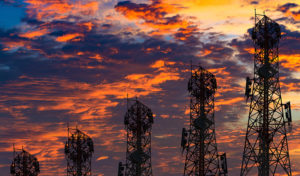A cell site is vital in ensuring strong and reliable cellular service. Sometimes, a cell company will want to construct a cell tower in HOA communities. What should homeowners associations do when presented with this opportunity?
The Advantages of a Cell Tower in HOA Communities
Many homeowners associations leap at the chance to have a cell tower in their communities. And there are two reasons behind this line of thinking — extra income and better signal.
1. Extra Income
 First, a cell tower provides HOAs with additional income. Homeowners associations generally rely on member dues as their primary source of income. And while most homeowners pay their dues diligently and punctually, it is not uncommon for an HOA to experience a high delinquency rate, especially during times of economic distress. A cell tower can give associations a much-needed boost to supplement their cash inflow.
First, a cell tower provides HOAs with additional income. Homeowners associations generally rely on member dues as their primary source of income. And while most homeowners pay their dues diligently and punctually, it is not uncommon for an HOA to experience a high delinquency rate, especially during times of economic distress. A cell tower can give associations a much-needed boost to supplement their cash inflow.
Carriers typically lease the land where they build their cell towers. That means your HOA can charge a monthly rental fee to accommodate the tower and any surrounding space it needs for maintenance. You can even sell the lease to a provider, who will collect rent from the carrier and pay the HOA a lump sum. Sometimes, this lump sum could be higher than the total rental fee.
The association can use this added income to reduce the financial obligations of homeowners to the community, deposit it into the reserve account, or fund a different project entirely.
2. Better Signal for Residents
There is no denying that cellular service can be a pain point for users. You get a good signal if you live just a short distance from the nearest tower. Having a cell tower right in the neighborhood can significantly improve service. The community can benefit from more reliable cell service and faster data. A stronger signal is certainly a huge bonus for a society that relies heavily on mobile phones and smart devices.
The Disadvantages of a Cell Tower in HOA Communities
Cell towers have their advantages. But, there are equally impactful disadvantages that communities must consider, such as aesthetics, management, and health effects.
1. Aesthetically Displeasing
Let’s face it — cell towers can be very unattractive, and having a massive chunk of metal in the middle of a gorgeously green community can turn people off. But this is nothing that clever placement and design can’t fix.
If your HOA board is up to the challenge, you can search for a spot in the community where a cell tower can still function optimally without looking out of place. You can even surround the tower with a modern fence and art sculptures to enhance the space instead of making it look barren.
2. Lack of Relationship Management
A carrier is a tenant, and the HOA should manage its relationship with its tenants well. That responsibility typically falls on the board’s shoulders, but it can be challenging. Fortunately, if you already have an HOA manager, the manager can also take over this role. The HOA manager can coordinate with the carrier to ensure everything’s in good shape and even take charge of renewal talks in the future.
3. Perceived Health Hazards
A lot of people dislike cell towers near their homes because they think these towers pose health hazards. This is one argument that homeowners always have against putting up a cell tower in HOA. But is there some truth to it?
Cell towers do transmit and receive signals with the help of radiofrequency (RF) waves. However, according to the American Cancer Society, no substantial evidence currently exists that RF waves can cause adverse health effects to people exposed to them. That isn’t to say that there will be no health effects whatsoever. Since cell towers are relatively new technology, more time and research are needed to know for sure.
Can You Set Up a Cell Tower in HOA?
 When allowed to earn extra income, many associations immediately agree. But, it’s unwise for an HOA board to approve without considering all facets of the decision.
When allowed to earn extra income, many associations immediately agree. But, it’s unwise for an HOA board to approve without considering all facets of the decision.
Above all else, the board must do right by the community. Although it’s a great way to augment the association’s income, the board should gather input from the homeowners first. Bringing up the topic at an open board meeting is an excellent way to test the waters. This will allow your board to gauge whether or not homeowners are amenable to the idea.
It is worth noting that some associations require boards to secure a majority vote from the membership for such decisions. Whether or not a vote is needed in your HOA will depend on your bylaws and CC&Rs. Even if your governing documents don’t require it, it’s best to vote anyway. This will give homeowners a voice and allow you to satisfy the majority.
If the majority votes against it, your board should abandon the idea. While it can benefit the association financially, the risk of unrest and potential lawsuits isn’t worth it.
Negotiating a Cell Tower in an HOA Community
Assuming homeowners favor the cell tower, the next step is negotiations. Carriers will usually present a contract they have drafted themselves and don’t just sign it without reviewing it with a professional. Getting the best deal possible is part of your duty as an HOA board member.
Some of the items your contract should cover include the following:
- Where will the cell tower be placed specifically?
- Who is responsible for maintenance and repairs?
- Who is responsible for upgrades?
- How much access is the HOA granting the carrier?
- How much is the monthly rent?
You should also clarify inspection and installation details. The area should be strong enough to hold the cell tower in place for many years. It is also worth asking the carrier to make the tower more aesthetically pleasing. Nowadays, towers can come in many shapes and forms, and it’s not an unreasonable request for the carrier to cover the cost of embellishments.
Is a Cell Tower a Good Idea?
Having a cell tower in HOA communities definitely has its pros and cons, so no single answer will apply to all associations. Some communities welcome the added income and strong cell service, while others are more concerned about aesthetics and health effects. Regardless, HOA boards should seek homeowners’ input and professional help before committing to anything.
Cedar Management Group provides reliable HOA management services to homeowners associations. We can help negotiate contract terms and coordinate with vendors or tenants. Call us today at (877) 252-3327 or contact us online to learn more!
RELATED ARTICLES:
- What’s The Importance of Vendor Contracts For HOA Projects?
- 7 Things To Check Before Signing An HOA Contract
- HOA Disaster Team: Does Your HOA Need One? How To Form It?






